I wish now, we had chosen a more interesting first world problem as "transport/traffic" doesn't exactly get the heart racing. If we had chosen a subject that could have been taken more light-hearted we could have been taken more seriously. The pitch itself was also a little disappointing. I work with Cailan who is always so positive, but for me personally, I thought we both somewhat crumbled in the pitch. There was a confidence issue from both of us, and not knowing our slides that well did not help either.
I think we had done a really good amount of research for our project but it was probably focused slightly in the wrong place. We should have completed an in-real-life set design as well as having more details about what studio segments we would include. We also had a very heavily-based VT show which may have let us down somewhat as well. I think overall our idea was very good, but our pitch let us down as well as our research into it. I would have enjoyed being the producer, but I did also enjoy the opportunity to be back to a hands-on camera operations role.
I will split the rest of this evaluation into my two roles VT Camera operator and Studio Camera operator. This will give me the best opportunity to explain both of my roles.
VT Camera
 The camera operation role for both my jobs had a slow start. This was because as it is a hands-on role a lot of your purpose happens right at the end. The VT camera role started with a lot of research into the role. I wanted to make sure that I understood my role as best as possible before I was actually filming. Through understanding the role of a camera operator through researching professionals and completing test shoots, I was in a good place when it came to filming the VT's
The camera operation role for both my jobs had a slow start. This was because as it is a hands-on role a lot of your purpose happens right at the end. The VT camera role started with a lot of research into the role. I wanted to make sure that I understood my role as best as possible before I was actually filming. Through understanding the role of a camera operator through researching professionals and completing test shoots, I was in a good place when it came to filming the VT'sIt would have been good to have any scripts or storyboards from the VT's before we shot, but I understand the director was having to change shots and plans very last minute so I can understand him not getting them to me in time. These would have been helpful to understand before the day what was exactly going to be shot but for the photoshoot especially, fine details were changing right until the last minute.
 The content from the first photo shoot was really good. I loved the four eras which translated into video really well. They all had a very unique style which was thanks to the producer and director thinking through the set design and the camera angles well. In this shoot, I was actually taken off the camera at stages which I did not like as I thought I should be doing my job role. This, on reflection, is something that I would have done differently. I would have made sure that the director did not take control of the camera because that is my job and I should have been at the controls of the camera at all times. Apart from that, I was really happy with the video that was captured during the photoshoot. I was tested as an operator shooting a genre that I had not done before but I adapted really well and managed to film to a high quality. Ideally, I would have done a test photo shoot beforehand to make sure I knew what would work and would not, instead of learning on the spot. Despite this, I was really impressed with this section and it looked really good in the final edit.
The content from the first photo shoot was really good. I loved the four eras which translated into video really well. They all had a very unique style which was thanks to the producer and director thinking through the set design and the camera angles well. In this shoot, I was actually taken off the camera at stages which I did not like as I thought I should be doing my job role. This, on reflection, is something that I would have done differently. I would have made sure that the director did not take control of the camera because that is my job and I should have been at the controls of the camera at all times. Apart from that, I was really happy with the video that was captured during the photoshoot. I was tested as an operator shooting a genre that I had not done before but I adapted really well and managed to film to a high quality. Ideally, I would have done a test photo shoot beforehand to make sure I knew what would work and would not, instead of learning on the spot. Despite this, I was really impressed with this section and it looked really good in the final edit.As for the second VT shoot which was an interview, we did not have the director in attendance, but that was fine as we worked well as a team to follow the ideas set to us by the director previously. We also had a two camera setup which was great for coverage but more of a challenge for setting up shots. We were aware that having two cameras would mean we would have to allow more time for setup. In hindsight, we underestimated how long it would take meaning we spent around 40 minutes setting the camera up. We probably should have only spent around 20 minutes setting up the camera, but thankfully our contributor completely understood that we wanted to make sure we got the best footage possible.
 As we had two cameras we did spend time making sure that we cameras pictures were matched. This took some time to match them as even though they were the same camera, as they were pointing at different angles they needed different amounts of light. After focusing the camera and formatting the memory card we started to shoot the second VT.
As we had two cameras we did spend time making sure that we cameras pictures were matched. This took some time to match them as even though they were the same camera, as they were pointing at different angles they needed different amounts of light. After focusing the camera and formatting the memory card we started to shoot the second VT.Unlike the first VT, I was fine not being the only camera operator because we had two cameras. I was still the operator focusing on the cutaways and getting the main shots, but either Alex or George would stand over the second camera getting a static wide shot. I was extremely pleased with my cutaway shots. The editor really liked the shots which was nice because as I did not have any directions from the director I did really have to think on my feet. It was nice to have the creative freedom actually, which I probably would have not got if it was all storyboarded. Overall, between the two cameras, we produced some quality footage with great cutaways which looked fantastic in the edit. I was happier with my performance today. I felt I was able to get the right focus and angle on every single shot. This shoot seemed to all come together and was a lot smoother than the first VT. It felt less rushed and the footage was much better for the second shoot. I think that both of the shoots were equally good after the edit, but I was happier with my own performance in the second VT shoot because of the number of quality shots I took.
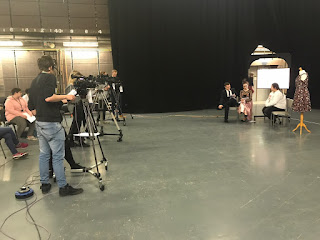
Studio Camera
The studio camera role started quite late onto the unit because of a lot of things needed to be completed before we could actually ever get on the camera. Things like the script, the set layout, VT's and stings all needed to be created, in some form, before we would ever be filming in the studio.
I researched into operating a studio camera and the possible problems that could occur when on the floor. After some research, I found the main issues of operating a camera in a studio could be:
- Wires on the floor (potential hazard)
- Cameras being in the way of the audience (This would ruin the viewing experience)
- Cameras running out of battery (It would be vital to have a spare at all times as well as having extra batteries on charge)
- Making sure each camera had a unique shot (We have 5 cameras on this shoot so there was a lot liaising with the camera operators and the directors to make sure we all had a unique shot)
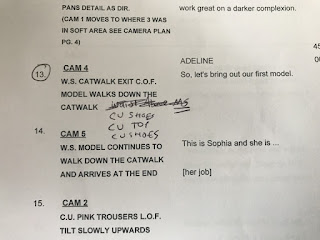
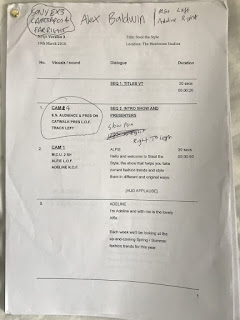 More issues would represent themselves as the studio unit would go on, But nothing that was hard to overcome.
More issues would represent themselves as the studio unit would go on, But nothing that was hard to overcome.
An example of how we kept on top of the ever-changing shots and camera movements was writing all extra information on our script.
This was a practice that we kept on top of throughout the unit and even in these earlier examples of the script, you can see clear evidence of me making sure I had all the information possible.
One problem we had throughout the process was the script being rather "loose". A lot of the time the script and it's camera shots would not be representative of what the presenters and contributors were doing. This meant a lot of the time we had to wait for the director to call a shot before actually knowing what was needed. Over time we did start to understand where our camera was located at certain points during the production.
The main problem with the script as it was never really updated in terms of camera shots so by the end we basically had to write down all our own information on the script to be able to cope.
This is by no means having a go at anyone, however, as I know everyone is doing a live production for the first time and some things will be overlooked. It was great to learn how to keep proper notes as I am sure that is a useful skill that will be very helpful in the future.
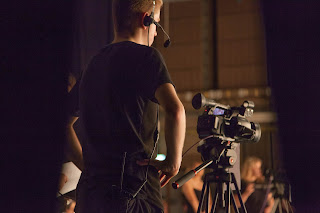 After the many rehearsals, we had mastered our camera movements, there were three of them in the end. It was tough at first to understand exactly when in the script we would have to change position. As the rehearsals went on, however, it was easy to pinpoint a time in the script and I made sure that I wrote that information on the script.
After the many rehearsals, we had mastered our camera movements, there were three of them in the end. It was tough at first to understand exactly when in the script we would have to change position. As the rehearsals went on, however, it was easy to pinpoint a time in the script and I made sure that I wrote that information on the script.
One thing throughout the process that was an issue for all of the camera crew was knowing if our shots were being broadcast in the gallery. The DVI wire that connected to the cameras to the Studio's system was temperamental and we all had issues with it. Luckily we had technical support from the Maidstone studios staff which helped. It would have been nice to actually understand how the wire actually worked but in all honesty, it was a great learning experience to understand and overcome problems.
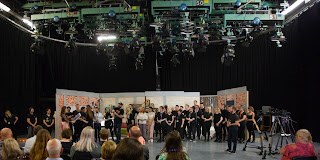 After all of the rehearsals, it was finally time for the live production which went to plan which was fantastic. On our camera, we had a really good run, which was equally as good as our final rehearsals which was nice because there was much more pressure on the actual day. I was happy that I had taped down all of the camera positions because it meant the moves were less of an issue. Working as a team with my camera operator Cailan was also very helpful as we both let each other know what the next shot for our camera would be. By the final take, we did more or less know the camera positions and timings off by heart. Having someone there to help though was always a help as we wanted to make sure we nailed it on the actual shoot.
After all of the rehearsals, it was finally time for the live production which went to plan which was fantastic. On our camera, we had a really good run, which was equally as good as our final rehearsals which was nice because there was much more pressure on the actual day. I was happy that I had taped down all of the camera positions because it meant the moves were less of an issue. Working as a team with my camera operator Cailan was also very helpful as we both let each other know what the next shot for our camera would be. By the final take, we did more or less know the camera positions and timings off by heart. Having someone there to help though was always a help as we wanted to make sure we nailed it on the actual shoot.
I managed to complete all my shots without issue which was great because my anxiety did hit in the production because of the worry of anything going wrong could be caught. It did not help that it was extremely hot in the studios with all the lights and the audience but we managed to still hold the professionalism we had shown throughout.
After the credits rolled there was a sigh of relief as I was worried something would have gone wrong. But looking back at the production now I am really happy with how it all went. I feel I challenged myself which enabled me to learn new things. For me, the most important things I learned was how to work with a large group effectively. It was strange going from a small group to a 30+ Maidstone studios help sized crew. I think we all adapted well and we all understood the pressure of each others job which was helpful.
In some ways, I wish I had pushed myself even further, but in hindsight, you always feel you would be able to do more knowing how the situation played out. Here is a list of what I could change if I could right now.
- I would make sure I spent all of the first VT shoot on the camera. I was disappointed not to be in complete control of the camera on that day as I thought that was my job
- It would have been nice to have the scripts and storyboards before out VT shoot days because then I could have prepared better for the shoot days
- It would have been nice for the studio script to be fully representational of what the directors are asking. I completely understand that it was a tough task for them so writing our own notes was not much of an issue.
- Lastly, I would have spent more time myself doing test shoots to understand what works and does not work during a particular VT. I could have done this in the early stages of the unit as there were weeks when as a camera operator I did not have much to do. In hindsight, I should have
To conclude. This project was a massive success and the issues we had were great to learn from and we made the best of each scenario that we found ourselves in. I am really happy with my personal input to the project, especially in the VT Segments. The VT's looked really nice and I am happy to put my name on them. I know for myself that a studio environment is not my ideal setting but after speaking to Del and learning more about working in a studio, I enjoyed it much more than I would have ever expected.
The feedback from peers and audience members was great as I was unsure how the studio segment would be received. In reality, it was an incredibly professional production and one we can all be proud of. I am happy to have battled my anxiety and battled being quiet and trying to get a voice. I am happy I pushed myself and I managed to interact really well with the rest of the group to voice my opinion when needed. Overall I would not change my approach to this unit but I do wish I have been a little more proactive in the early stages of this unit to ensure I knew exactly what to do on a shoot day.
I'm sad it's over, but also happy we did it. I am looking forward to the next challenge!


No comments:
Post a Comment